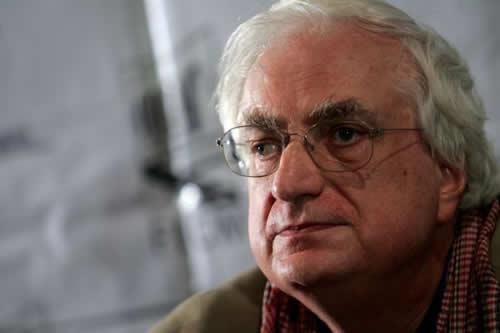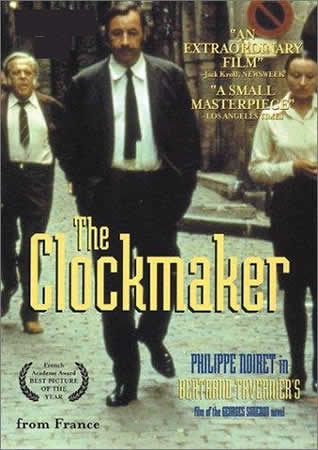 With Bertrand Tavernier’s impressive 1974 debut feature, “The Clockmaker Of St. Paul” the director’s already assured filmmaking made apparent themes and tones that he would refine throughout his prolific career. The meditative World War I portrait “Life And Nothing But” and the 1950s jazz portrait “‘Round Midnight” both display Tavernier’s elegant fascination with the historical, while such films as the documentary-like “L.267” and the ethical sci-fi drama “Death Watch” proved the nimble director also could be rooted in the modern. Tavernier’s latest film, “The Princess Of Montpensier” set in 16th-century France during the Catholic-Protestant wars, received critical praise in 2010 from prestigious international festivals including Cannes and Telluride.
With Bertrand Tavernier’s impressive 1974 debut feature, “The Clockmaker Of St. Paul” the director’s already assured filmmaking made apparent themes and tones that he would refine throughout his prolific career. The meditative World War I portrait “Life And Nothing But” and the 1950s jazz portrait “‘Round Midnight” both display Tavernier’s elegant fascination with the historical, while such films as the documentary-like “L.267” and the ethical sci-fi drama “Death Watch” proved the nimble director also could be rooted in the modern. Tavernier’s latest film, “The Princess Of Montpensier” set in 16th-century France during the Catholic-Protestant wars, received critical praise in 2010 from prestigious international festivals including Cannes and Telluride.
French director, screenwriter, actor, and producer, prolific Bertrand Tavernier has directed 31 films. A dedicated, knowledgeable film buff, he is as conversant with Hollywood films as his French patrimony.
Teenaged Tavernier founded his own cinema magazine, L’Etrave. Interviewing Jean-Pierre Melville, Melville hired the young cinephile as an assistant director on “Léon Morin, Pretre” then hired him as press agent on ” Le Doulos” (1962) and convinced his parents to let their erstwhile while law student to sty in the film business. Press agent for the prolific producer Georges de Beauregard, Tavernier flogged many New Wave classics: “Cleo de 5 à 7” (Agnès Varda, 1961), “L’oeil du malin” (“The Third Love”) (Claude Chabrol, 1962) “Le Mépris” (Contempt)(Jean-Luc Godard, 1963), ” Les Carabiniers” (Jean-Luc Godard, 1963), to name a few. As a press agent working with Pierre Rissient he championed Hollywood auteurs and newer filmmakers, introducing Robert Altman, John Boorman, Sam Fuller, Howard Hawks, Ken Loach, Joe Losey, Michael Powell, Alain Tanner and Raoul Walsh to French audiences,
Tavernier’s earliest films were genre mysteries, his later work has become more historically and socially conscious. An engagée director, Tavernier feels morally responsible for the images he shows an audience. He delights in using Scope to frame his protagonists in their larger social context. Like Renoir, his complex frames elicit our involvement. We must scan the compositions; nothing is served up to us. His meal sequences evoke the atemporal quality of the European shared ritual. Tavernier’s historical films are more densely nuanced, more meticulously observed than films by other contemporary filmmakers. “Laissez-passer” (“Safe Conduct”), Tavernier’s film about the French film business during the German Occupation, is a case in point.
Tavernier’s newest, “The Princess of Montpensier”, was nominated for six César Awards and won one for Best Costume design (Caroline De Vivaise.)
Best Adapted Screenplay (Jean Cosmos, François-Olivier Rousseau, Bertrand Tavernier), Best Newcomer (Male-Raphaël Personnaz), Best Original Score (Philippe Sarde), Best Cinematography (Bruno De Keyzer) and Best Art Direction (Guy-Claude François.)
Tavernier is the president of the film culture preservation organization, L’Institut Lumiere. His compendious study of Hollywood film, “30 ans de cinéma américain”, which he wrote with Jean-Pierre Coursodon, has shamefully, never been published in English.
Tavernier’s 1979 “Death Watch” was already critiquing the ethical dangers of voyeurism, before “Reality TV” was somebody’s bright idea. His documentary-like “L.267” shows us the numbing, day-to-day grind of an urban Police Narcotics unit. Lulu, a failed director, shoots wedding films on the side, and watches his films of drug busts incessantly, but refuses to film a junkie nodding, leaving us and feeling grimy and complicitous watching same junkie in Tavernier’s frame. He struggles to get Cecile, an HiV positive addicted prostitute off her junk.
wedding films on the side, and watches his films of drug busts incessantly, but refuses to film a junkie nodding, leaving us and feeling grimy and complicitous watching same junkie in Tavernier’s frame. He struggles to get Cecile, an HiV positive addicted prostitute off her junk.
Two of his collaborations with Phillipe Noiret are featured. They made six films together): Tavernier’s first film, “The Clockmaker Of St, Paul” and “Life And Nothing But.”
Wednesday, March 2 – 7:30 PM
THE CLOCKMAKER OF ST. PAUL (L’HORLOGER DE SAINT PAUL)
1974, Joseph Green Pictures, 105 min.
In Bertrand Tavernier’s directorial debut, the actor who would come to be known as his “alter ego,” Philippe Noiret, stars as a father in silent denial of his son’s criminal activity, which ranges from destructive to heinous. A clear-eyed critique of the moral corrosion that lurks under – and is fed by – the bourgeois lifestyle. In French with English subtitles.
Wednesday, March 9 – 7:30 PM
THE PRINCESS OF MONTPENSIER
2010, Sundance Selects Films, 139 min. Dir. Bertrand Tavernier.
It is France 1562, and heiress Marie de Mézières (Melanie Thierry) loves the young Duc de Guise, known infamously as “Scarface” (Gaspard Ulliel), but is instead forced to marry the Prince of Montpensier for political reasons. When the new princess is sequestered in an isolated castle in the countryside, she becomes caught up in a violent, passionate rivalry between the many men who wish to claim her as their prize. In French with English subtitles.
“Tavernier’s helming here is as elegantly fluid as his best work, weaving historical weft with private warp with the same seamlessness he achieved in LIFE AND NOTHING BUT.” – Variety. Discussion following with Bertrand Tavernier and actor Gaspard Ulliel, moderated by Steven Gaydos, Variety.
Wednesday, March 16 – 7:30 PM
LIFE AND NOTHING BUT (LA VIE ET RIEN D’AUTRE)
1989, MGM Repertory, 135 min. Dir. Bertrand Tavernier.
At the end of World War I, the aging Major Dellaplane (Philippe Noiret) has been given the soul-numbing job of matching 350,000 missing French soldiers with their families’ descriptions. When haughty Parisian Irene (Sabine Azema) arrives searching for her missing husband, the two strike up an unusual, increasingly tender relationship in the midst of the bleakest of aftermaths.
http://www.youtube.com/watch?v=XKCG-Saxc9g
Wednesday, March 23 – 7:30 PM
‘ROUND MIDNIGHT
1986, Warner Bros., 133 min. Dir. Bertrand Tavernier.
Jazz legend Dexter Gordon gives the performance of a lifetime as saxophone player Dale Turner, a talented musician whose alcoholism and alienation are getting the best of him in 1950s New York. When Dale is invited to play at a club in Paris, he enjoys a few precious moments of freedom from racism, and a moving if brief relationship with his young daughter and an enthusiastic local fan. http://www.youtube.com/watch?v=PxRQ1iFmGvY
American Cinematheque’s Aero Theatre
1328 Montana Ave at 14th St
Santa Monica, CA 90403
www.americancinematheque.com
Tickets: http://www.fandango.com/egyptiantheatre_aaofx/theaterpage
$11 General, $9 Student/Senior, $7 American Cinematheque Members
This program is co-presented with French Film & TV Office, French Embassy, With the support of E.L.M.A. (European Languages and Movies in America)

